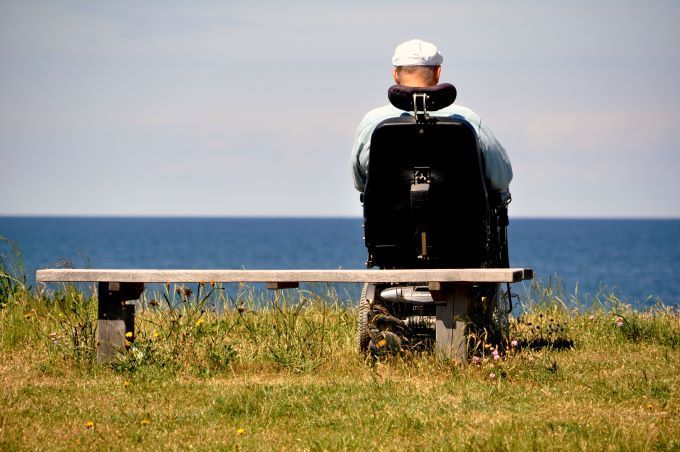Assisted Living for Disabled Adults
Learn about assisted living for disabled adults with Seniorly. Assisted living can be a good fit for adults with certain types of disabilities.

Although we primarily serve seniors and their families here at Seniorly, there are people of varying ages who might need assisted living at some point in their lives. Assisted living for adults with disabilities fills a need for people with mobility issues, cognitive impairment, or other conditions that make it difficult to handle the tasks of daily life, or to live independently in a traditional home.
Assisted living communities provide help with the activities of daily living (ADLs). ADLs are a measure used by medical professionals to determine whether someone can live independently. This includes questions like: Can this person keep themselves and their home clean and orderly? Do they struggle to shop for groceries or prepare meals? Can they safely move about their home and community in order to care for themself? Determining whether a senior or a person with a disability can perform ADLs on their own (or with reasonable assistance) helps care professionals know what level of care that person needs. Many people with disabilities are perfectly capable of living independently with the help of, for example, delivery services and assistive technology, but others might need help with daily life. That’s where assisted living for disabled adults can help, although this is just one of several options available.
Types of disabilities
The term “disability” covers a very wide range of conditions, and even two people with the same type of disability might have totally different needs. Broadly speaking disabilities often fall into the following categories:
- Sensory disabilities, like visual or hearing impairment, or blindness or deafness
- Physical disabilities, that affect one’s mobility or dexterity, such as paralyzation or a condition like cerebral palsy
- Mental illness or psychiatric disabilities, which can affect thinking, emotions, and behaviors
- Intellectual or learning disabilities that can make it difficult to process or retain information
It pays to remember that a person may experience more than one of these types of disabilities at any given time, and that some debilitating conditions might degenerate over time. So even if someone lived independently or with the help of family members or caregivers for many years, there may come a point when their physical and/or mental health makes finding care imperative.
Types of homes for people with disabilities
While many people with disabilities are able to live independently, others need help with dressing, bathing, mobility, eating, and other daily activities. There are a variety of types of homes for disabled adults, many of which also apply to the senior care space.
Assisted living for people with disabilities
In general, assisted living communities are designed to support people with physical or sensory disabilities, as these are the type most often experienced by seniors as we age. As discussed above, assisted living staff can help with daily personal care by providing three meals a day, housekeeping, and help with bathing, dressing, toileting, and mobility. Although many assisted living communities are well-equipped to also handle the average forgetfulness that can come with age — providing medication management, for example, so that seniors take their medication as prescribed — they are not capable of providing psychiatric care or meeting the specialized needs of people with severe intellectual disabilities. All assisted living facilities should follow accessibility requirements as a default design, as they are built to provide a safe home for people with mobility issues.
Board and care homes for disabled adults
Board and care homes typically provide the same type of care as assisted living facilities, but in much smaller and more intimate settings. Board and care homes typically look like single family homes, but provide room, board, and help with ADLs for a small number of people. The more personalized attention of a board and care home, with its smaller staff-to-resident ratio, is an attractive assisted living option for seniors, disabled seniors, and younger disabled people.
Skilled nursing facilities for disabled
Skilled nursing facilities were developed for people to recover from illness, injury, or surgery outside of hospitals. When you need daily medical care like wound care, injections, or physical therapy, skilled nursing facilities can help. Disabled people with complex medical conditions who need around-the-clock healthcare can find private or shared rooms in skilled nursing care facilities (often referred to as SNFs, or nursing homes).
Group homes/supportive housing for people with disabilities
Sometimes people with disabilities, particularly developmental disabilities, might choose to live in group homes. These group homes might provide light support and/or structure in the form of counselors or other staff, but by and large provide independent living, and offer residents with the opportunity to socialize with peers who also have special needs.
Independent living for people with disabilities
Though obviously "independent living" can simply refer to living in a private home, in the world of senior living there are independent living communities, where seniors can live with peers and pursue active lifestyles. Often these communities are restricted to seniors aged 55 and up, and although they likely follow accessibility requirements, they don't provide help with ADLs. Usually these communities look like gated communities or apartment complexes, but they don't provide additional services like help with ADLs or medical care. Although seniors with some types of disabilities would be able to live independently in this type of community, they are unlikely to accommodate younger people with disabilities. And although you might be able to bring in third-party healthcare workers, this will cost more than it probably would to simply choose an assisted living facility.
Help finding housing options for people with disabilities
The Fair Housing Act prohibits housing discrimination on the basis of race, color, religion, sex, disability, familial status, and national origin. This includes private housing, and housing that receives Federal financial assistance, and State and local government housing. Since they are designed to help seniors and/or people with disabilities, it’s unlikely that you’ll face discrimination from assisted living, board and care, or skilled nursing facilities, however it’s good to know that the law is on your side.
If you’re having trouble finding housing for yourself or a disabled loved one, explore government resources that can help you find affordable housing, subsidies for making changes to a private home to accommodate disability, or help with learning the skills needed to live independently. You can find support services at the federal, state, and local levels.
How much does assisted living for disabled people cost?
Per Seniorly data, the average cost of assisted living in the US is about $3,931 in 2020. This number will fluctuate substantially depending on where you live, the level of care services you need, as well as from community to community.
We've found that the average cost of a skilled nursing facility is $4,103 per month. This is due in part to the skilled health services provided, but keep in mind that most people only need skilled nursing care for a limited time.
Independent living communities cost an average of $2,880 per month. Remember, though, that as with all averages, this number will vary widely depending on you or your loved one's care needs, as well as location and the community's amenities and services.
Financial assistance for housing for people with disabilities
HUD
The U.S. Department of Housing and Urban Development (HUD) can help you with rental assistance , housing programs, or subsidized housing. Keep in mind though, that due to high demand, wait times for applications are very long, sometimes as long as two years. Consider consulting with a HUD-approved housing counselor to see if you’re eligible for aid or housing in your area.
Medicare
Medicare can help pay for home care if you are eligible for these benefits, however it will not pay for long-term care like assisted living. A doctor must certify that you are housebound, require skilled nursing care, or particular types of speech, physical, or occupational therapy in order to receive financial assistance for these types of care.
Medicaid
Medicaid will help low-income people depending on their income and family size. Medicaid benefits vary from state to state, but most will help with some costs of assisted living if you are eligible. Some states are able to offer Medicaid waivers, which can help provide services that aren't usually covered by Medicaid at the Federal level.
Social Security
In addition to Supplemental Security Income (SSI), Social Security can provide financial assistance with assisted living costs on a state-by-state basis for eligible seniors and people with disabilities. These benefits are called Optional State Supplements (OSS) or State Supplementary Payments, and are paid directly to the assisted living community. This amount can range from a few dollars to $1,000 per month depending on your state’s policies and your income.
More resources
Many older adults experience some type of disability as they age. This might be hearing loss or vision impairment, or simply needing to use a cane or walker for stability as they go about their day. Your care needs, or your loved one's, will dictate what type of community you will thrive in, and this type of community might change over time. Some disabled adults may flourish in their own homes for many years and need assisted living only in their later years, while some might be very comfortable for years in assisted living and eventually require skilled nursing care. It can be difficult to navigate the process of finding the right home where you'll feel safe and welcome, but there are resources that can help. You can start your search for residential care right here with us, by inputting your zip code below, or you can find help from organizations like your local department of human services, or organizations like these:
Content Contributor at Seniorly
To learn more about Seniorly's editorial guidelines, click here.
Sign up for our Healthy Aging Handbook
Seniorly’s Senior Living advisors created a comprehensive handbook to help people age happily while ensuring they love where they live. Enter your email address below to receive your copy and learn more about Healthy Aging and Senior Living.*
*By submitting your email address above, you consent to receive occasional email communications from Seniorly, including educational content and tips, newsletters, and other relevant updates and offerings. You can unsubscribe at any time and we will never sell or distribute your email address to a third party. You can view our Privacy Policy here.
